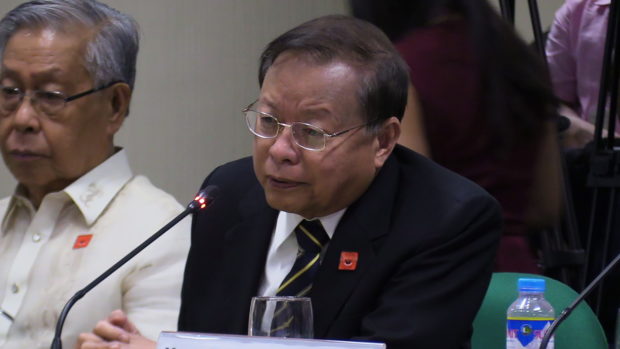
Reynato Puno, Former Chief Justice of the Supreme Court of the Philippines. INQUIRER.net / CATHY MIRANDA
Former Supreme Court Chief Justice Reynato Puno on Monday called for “moderation” in the checks and balances in government during the first meeting of the Charter change consultative committee.
In his speech to the committee’s en banc, Puno stressed the need for “a new balance of power” among the executive, legislative and judiciary.
“There ought to be a moderation on the extreme exercise of the checking power by each branch of government that often results in deadlocks, which when prolonged, petrifies the progress of the people,” he said.
The former chief magistrate chairs the 19-member consultative committee tasked by President Duterte to study draft proposals that would be needed to amend the 1987 Constitution.
The draft, which will be submitted to Congress, will guide legislators in changing the form of government from presidential to federal.
‘One voice’
“On certain issues of primordial importance to the political, economic and social interest of our people, the three departments of our government must speak with one voice,” Puno said.
In an interview after the meeting, Puno talked about the importance of a single voice.
“In critical issues, there should be less clashes between and among the three branches. For instance in foreign relations, it should only be one voice. If you have dissonance of voices, to my mind that is nothing but noise,” he said.
Less prepared regions
In his speech, Puno also pushed for a “cooperative federalism” as he conceded that some regions were less prepared for the shift to a federal system of government.
Citing fiscal data, he said that some regions were expected to encounter difficulties in becoming viable states and would thus prefer to take baby steps, while other regions would be ready to embrace federalism.
“Given the permutations of their predicament, and the clear picture of the coming together of strong and weak states, rich and poor regions, it ought to be self-evident that the regime that should govern their relationship is what is known as cooperative federalism as opposed to competitive federalism,” he said.
“Cutthroat, unfair and unforgiving competition that could threaten the survival and sustainability of constituent states ought to be prohibited and should invite the intervention of the federal government,” he added.
At the en banc session, the committee’s 19 members tackled the membership of the seven subcommittees, namely: structure of federal government; creation of states; economic reforms and fiscal administration; social and political reforms; national territory, state policy, foreign affairs, national security, public order and safety; constitutional bodies and public accountability; and transition and amendments.